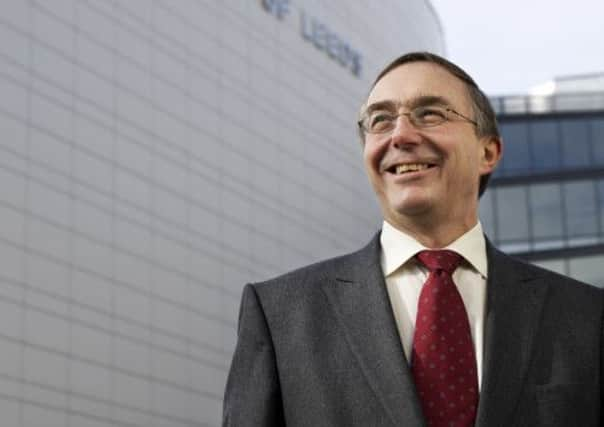Reformer leaves top university on a high note


He also defended the university’s decision to launch a £35m cost cutting exercise four years ago which he said had helped to ensure it was in a financially healthy position today.
Prof Arthur spoke to the Yorkshire Post ahead of his move to London to become the president and provost at UCL after nine years leading Leeds University.
Advertisement
Hide AdAdvertisement
Hide AdHe said the institution was more confident than it had been in 2004 and said one of the biggest achievements during his time in charge had been to make sure that academic research and teaching were more closely linked.
One of the most controversial decisions he took was an economies exercise launched in 2009 to save £35m to avoid a forecast shortfall.
Prof Arthur has said not to have done so could have left the university facing “dire financial straits” at a time when the higher education sector was undergoing major changes to the way it was funded.
Prof Arthur led the university and was also chairman of the elite Russell Group at a time when the Government almost trebled the amount universities could charge students while cutting their teaching funding. Leeds University was one of those which brought in fees of £9,000.
Advertisement
Hide AdAdvertisement
Hide AdHe said: “It has been a difficult change for students and for the sector generally but I think there was an inevitability to it for two reasons; austerity and the desire to reduce public funding and the need to improve funding into higher education to remain internationally competitive.” Tuition fee reforms had been a “good thing overall”, he said, because it had put the funding of higher education on a more secure footing.
He said the repayment schedule which sees graduates start to pay off their loans once they start to earn more than £21,000 was as “generous” as any system in the world. Under the system introduced in 2012 graduates have their tuition fee debt cancelled after 30 years if it is not paid off.
Prof Arthur has, however, also been critical of other reforms introduced as part of the higher fee regime.
The Government has reduced the number of capped places each university can offer but has then allowed institutions to recruit an unlimited number of top A-level students above a set threshold.
Advertisement
Hide AdAdvertisement
Hide AdLast year universities were allowed to recruit an unlimited number of AAB students and this year it was lowered to ABB.
In 2012 when the system was introduced universities had their places cut by the number of AAB students they had recruited the previous year. The expectation was that these institutions could get these numbers back by attracting the AAB candidates.
The reforms were designed to ensure popular universities were not forced to turn away high performing students However last year a drop in top A-level grades meant there were around 8,000 fewer students above the AAB threshold nationally than had been expected.
The situation left Leeds University with an “unprecedented” number of places unfilled – more than 500. Prof Arthur said the situation had particularly affected the university’s ability to recruit students who had chosen Leeds as an insurance offer.
Advertisement
Hide AdAdvertisement
Hide AdTo avoid a repeat this year the university made a priority of attracting as many students as they could who chose Leeds as their first choice.
Prof Arthur said he did not like the artificial threshold of AAB and ABB as it created turbulence in the sector.
When asked how the university he was leaving differed from the one he took on charge of in 2004 he said: “The university is a much more confident place which is very clear about what it is trying to achieve. The biggest thing we have done here is make the teaching and the students as important as the research. We have successfully integrated the two and that has been done very deliberately.”
Prof Arthur said this approach helped to bring “research to life” for students and ensured the university’s teaching remained at the cutting edge.
Advertisement
Hide AdAdvertisement
Hide Ad“In the Research Assessment Exercise in 2008 we moved up from 26th to 14th and we now have the eighth largest research income in the country.” Prof Arthur said he was pleased the university had also seen improvements in other key indicators since he took over, such as moving from 133th to 94th in the QS world university rankings and seeing improved National Student Survey scores.